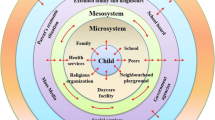Abstract
This article examines how Bedouin mothers in Israel describe, perceive, and interpret their experiences raising a child with autism. Data were collected using semi-structured ethnographic interviews with 18 Bedouin mothers of children with autism, aged 6–16, living in recognized and unrecognized settlements in the Negev. Analysis of the study findings shows how the subaltern status of Bedouin women, which includes their husbands’ constant threats of divorce or taking a second wife, makes it difficult for them to be mobile and interact in the public sphere without the presence of a man and creates an experience unique to these mothers, which we call “Exclusion within Exclusion”. The Bedouin mothers report not only stigmatization, a lack of social support and loneliness but also structural–cultural characteristics that prevent them from obtaining information and participating in decision-making about the child with autism and that restrict their agency in dealing with and coping with their child’s autism. In light of this situation, the discussion highlights the unique connection between local cultural scripts and the phenomenology of autism.
Similar content being viewed by others
References
Abu Ajaj, O. 2017 Aspects of Coping Among Fathers of Adolescents Children with Autism in the Bedouin Community of the Negev. Master’s Thesis, University of Haifa, Haifa.
Abudabbeh, N. 1996 Arab families. In M. McGoldrick, J. Giordano, & J. K. Pearce (Eds.), Ethnicity and Family Therapy (pp. 333–346). New York: Guilford.
Al-Krenawi, A. & Graham, J.R. 2001 Polygamous family structure and its interaction with gender. Effect children’s on academic achievements? Implication for culturally diverse social work practice in schools. School Social Work Journal, 25(3), 1-16.
Al-Odaib, A. N., Abu-Amero, K. K., Ozand, P. T., & Al-Hellani, A. M. 2003 A new era for preventive genetic programs in the Arabian Peninsula. Saudi Medical Journal, 24(11), 1168–1175.
Asai, M. O., & Kameoka, V. A. 2005 The Influence of Sekentei on family caregiving and underutilization of social services among Japanese caregivers. Social Work, 50(2), 111–118.
Atkinson, P., A. Coffey, S. Delamont, J. Lofland, and L. Lofland 2001 Handbook of Ethnography. London: Sage.
Avdi, E., Griffin, C., & Brough, S. 2000 Parents’ Constructions of the ‘Problem’ During Assessment and Diagnosis of Their Child for an Autistic Spectrum Disorder. Journal of Health Psychology, 5(2), 241–254.
Berg, B. 2004. Qualitative Research Methods for the Social Sciences. Boston, MA: Pearson Education.
Bourdieu, P. 2000. Pascalian Meditations. Stanford: Stanford University Press
Burnard, P. 1991. A method of analyzing interview transcripts in qualitative research. Nurse Education Today, 11, 461-466.
Corrigan, P., Markowitz, F., Watson, A., Rowan, D., & Kubiak, M. A. 2003 An attribution model of public discrimination towards persons with mental illness. Journal of Health and Social Behavior, 44(2), 162.
Creswell, J. 2007 Qualitative inquiry and research design: Choosing among five approaches. Thousand Oaks, CA: Sage Publishing House.
Daley, T. 2004 From symptom recognition to diagnosis: Children with autism in urban India. Social Science & Medicine 58(7), 1323-1335. https://doi.org/10.1016/s0277-9536(03)00330-7.
Dwairy, M. 2004 Individuation among Bedouin versus urban Arab adolescents: Ethnic and gender differences. Cultural Diversity & Ethnic Minority Psychology, 10 (4), 340-350.
Garcia, S.B., A.M. Perez, & A.A. Ortiz 2000 Mexican American mothers’ beliefs about disabilities. Remedial and Special Education, 21(2), 90-120.
Grinker, R. and K. Cho 2013 Border children: Interpreting autism spectrum disorder in South Korea. Ethos, 41(1), 46-74. https://doi.org/10.1111/etho.12002.
Ha, V.S., A. Whittaker, M. Whittaker, and S. Rodger 2014 Living with of autism spectrum disorder in Hanoi, Vietnam. Social Science & Medicine, 120, 278–285.
Jegatheesan, B., P. Miller, and S. Fowler 2010 Autism from a religious perspective: A study of parental beliefs in South Asian Muslim immigrant families. Focus on Autism and Other Developmental Disabilities, 25(2), 98-109.
Kidron, C.A. 2012 Alterity and the Particular Limits of Universalism: Comparing Jewish-Israeli Holocaust and Canadian-Cambodian Genocide Legacies. Current Anthropology, 53, 723-754.
Monthly Bulletin of Statistics 2017 Central Bureau of Statistics, Population. State of Israel.
Patka, M., C.B. Keys, D.B. Henry, and K.E. McDonald 2013 Attitudes of Pakistani community members and staff toward people with intellectual disability. American Journal on Intellectual and Developmental Disabilities, 118(1), 32-43.
Peters, J.S. 2009 Review of Marginalization of People with Disabilities in Leabanon, Syria and Jordan. Background Paper Prepared for the Education for all Global Monitoring Report 2010. UNESCO. www.unesco.org/new/fileadmin/MULTIMEDIA/FIELD/Beirut/pdf
Rassool, G.H. 2000 The crescent and Islam: Healing, nursing and the spiritual dimension. Some considerations towards an understanding of the Islamic perspectives on caring. Journal of Advanced Nursing, 32(6), 1476–1484. https://doi.org/10.1046/j.1365-2648.2000.01614.x
Sabirski, S., A. Aconor-Attias 2006 A Social Snapshot. Tel Aviv: Adva Center.
Samadi, S.A., and R. McConkey 2011 Autism in Developing Countries: Lessons from Iran. Autism Research and Treatment. https://doi.org/10.1155/2011/145359
Sarrett, J.C. 2015 Custodial Homes, Therapeutic Homes, and Parental Acceptance: Parental Experiences of Autism in Kerala India and Atlanta GA USA. Culture, Medicine and Psychiatry. https://doi.org/10.1007/s11013-015-9441-z
Shaked, M. 2005 The Social Trajectory of Illness: Autism in the Ultraorthodox Community in Israel. Social Science & Medicine 61(10): 2190-220.
Solomon, O., and M.C. Lawlor 2013 ‘‘And I Look Down and He is Gone’’: Narrating Autism, Elopement and Wandering in Los Angeles. Social Science and Medicine, 94, 106–114. https://doi.org/10.1016/j.socscimed.2013.06.034.
Spradley. P.J. 1979 The Ethnographic Interview. London: Holt Rinehart and Winston.
Strier, R. 2009 Class-Sensitive Social Work: A Preliminary Definition. International Journal of Social Welfare, 18(3), 237–242.
Author information
Authors and Affiliations
Corresponding author
Ethics declarations
Conflict of interest
The authors declared no potential conflicts of interest with respect to the research, authorship, and/or publication of this article.
Ethical Approval
Research involving human participants and informed consent was obtained from all individual participants included in the study.




